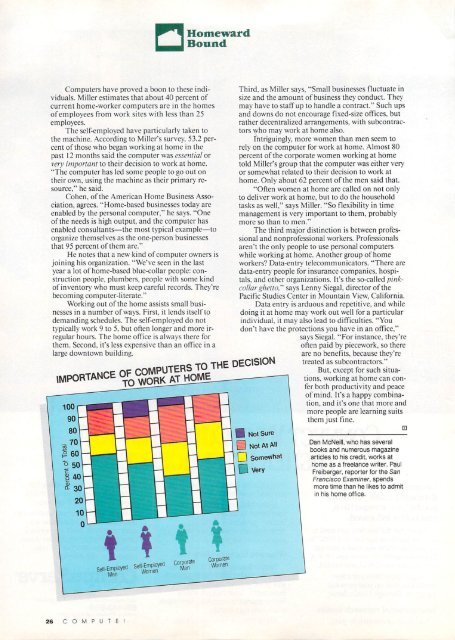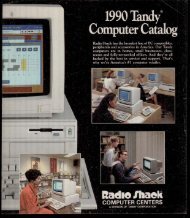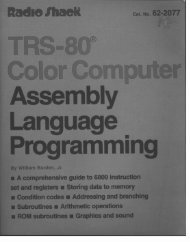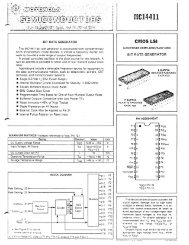Who Works at Home, Why, and How You Can Join Them How ...
Who Works at Home, Why, and How You Can Join Them How ...
Who Works at Home, Why, and How You Can Join Them How ...
You also want an ePaper? Increase the reach of your titles
YUMPU automatically turns print PDFs into web optimized ePapers that Google loves.
□ <strong>Home</strong>ward<br />
Bound<br />
Computers have proved a boon lo these indi<br />
viduals. Miller esiim<strong>at</strong>cs thai about 40 percent of<br />
current home-worker computers are in the homes<br />
of employees from work sites with less than 25<br />
employees.<br />
The self-employed have particularly taken to<br />
the machine. According to Miller's survey, 53.2 per<br />
cent of those who began working ai home in the<br />
past 12 months said the computer was essential or<br />
very important to their decision to work <strong>at</strong> home.<br />
"The computer has led some people to go out on<br />
their own. using the machine as their primary re<br />
source," he said.<br />
Cohen, of the American <strong>Home</strong> Business Asso<br />
ci<strong>at</strong>ion, agrees. "<strong>Home</strong>-based businesses today arc<br />
enabled by the personal computer," he says. "One<br />
of the needs is high output, <strong>and</strong> the computer has<br />
enabled consultants—the most typical example—to<br />
organize themselves as the one-person businesses<br />
th<strong>at</strong> 95 percent of them are."<br />
He notes th<strong>at</strong> a new kind of computer owners is<br />
joining his organiz<strong>at</strong>ion. "We've seen in the last<br />
year a lot of home-based blue-collar people: con<br />
struction people, plumbers, people with some kind<br />
of inventor-' who must keep careful records. They're<br />
becoming computer-liter<strong>at</strong>e."<br />
Working out of the home assists small busi<br />
nesses in a number of ways. First, it lends itself to<br />
dem<strong>and</strong>ing schedules. The self-employed do not<br />
typically work 9 to 5. but often longer <strong>and</strong> more ir<br />
regular hours. The home office is always there for<br />
them. Second, it's less expensive than an office in a<br />
large downtown building.<br />
Third, as Miller says, "Small businesses fluctu<strong>at</strong>e in<br />
size <strong>and</strong> the amount of business they conduct. They<br />
may have to staff up to h<strong>and</strong>le a contract." Such ups<br />
<strong>and</strong> downs do not encourage fixed-size offices, but<br />
r<strong>at</strong>her decentralized arrangements, with subcontrac<br />
tors who may work <strong>at</strong> home also.<br />
Intriguingly, more women than men seem to<br />
rely on the computer for work <strong>at</strong> home. Almost 80<br />
percent of the corpor<strong>at</strong>e women working <strong>at</strong> home<br />
told Miller's group th<strong>at</strong> the computer was cither very<br />
or somewh<strong>at</strong> rel<strong>at</strong>ed to their decision to work <strong>at</strong><br />
home. Only about 62 percent of the men said th<strong>at</strong>.<br />
"Often women <strong>at</strong> home are called on not only<br />
to deliver work <strong>at</strong> home, but to do the household<br />
tasks as well." says Miller. "So flexibility in lime<br />
management is very important to them, probably<br />
more so than to men."<br />
The third major distinction is between profes<br />
sional <strong>and</strong> nonprofcssional workers. Professionals<br />
aren't the only people to use personal computers<br />
while working <strong>at</strong> home. Another group of home<br />
workers? D<strong>at</strong>a-entry tclecommunic<strong>at</strong>ors. "There are<br />
d<strong>at</strong>a-entry people for insurance companies, hospi<br />
tals, <strong>and</strong> other organiz<strong>at</strong>ions. It's the so-called pinkcollar<br />
ghetto," says Lenny Siegal. director of the<br />
Pacific Studies Center in Mountain View. California.<br />
D<strong>at</strong>a entry is arduous <strong>and</strong> repetitive, <strong>and</strong> while<br />
doing it <strong>at</strong> home may work out well for a particular<br />
individual, it may also lead to difficulties. "<strong>You</strong><br />
don't have the protections you have in an office."<br />
DECISION<br />
says Siegal. "For instance, they're<br />
often paid by piecework, so there<br />
are no benefits, because they're<br />
tre<strong>at</strong>ed as subcontractors."<br />
But. except for such situa<br />
tions, working <strong>at</strong> home can con<br />
fer both productivity <strong>and</strong> peace<br />
of mind. It's a happy combina<br />
tion, <strong>and</strong> it's one th<strong>at</strong> more <strong>and</strong><br />
more people are learning suits<br />
them just fine.<br />
Not Sure<br />
Not At AH<br />
Somewh<strong>at</strong><br />
Very<br />
Dan McNeill, who has several<br />
books <strong>and</strong> numerous magazine<br />
articles to his credit, works <strong>at</strong><br />
home as a freelance writer. Paul<br />
Freiberger, reporter (or the San<br />
Francisco Examiner, spends<br />
more time than he likes to admit<br />
in his home office.<br />
26 COMPUTE

















